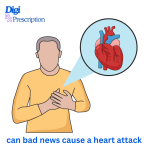
Can Bad News Cause a Heart Attack? Understanding the Link Between Stress and Heart Health
Receiving bad news—whether it’s the sudden loss of a loved one, financial stress, or a shocking event—can feel like a physical blow. But can emotional shock actually trigger a heart attack? Research suggests that extreme stress and grief can have serious effects on the heart, potentially leading to life-threatening conditions.
How Stress Affects the Heart
When faced with distressing news, the body activates the fight-or-flight response, releasing stress hormones like adrenaline and cortisol. These hormones increase heart rate, blood pressure, and inflammation, all of which can strain the cardiovascular system.
Key effects of stress on the heart:
- Blood vessel constriction – Reduces blood flow and increases blood pressure.
- Increased clotting risk – Makes heart attacks more likely.
- Elevated heart rate – Increases oxygen demand, putting stress on the heart.
Broken Heart Syndrome: A Real Condition
A sudden emotional shock can trigger a condition called Takotsubo Cardiomyopathy, also known as "broken heart syndrome." This temporary heart condition mimics a heart attack, causing symptoms like chest pain, shortness of breath, and irregular heart rhythms. Unlike a heart attack caused by blocked arteries, broken heart syndrome results from a surge of stress hormones that temporarily weaken the heart muscle.
Who is at risk?
- Middle-aged and older women (most common).
- Individuals with a history of anxiety or depression.
- Those with pre-existing heart conditions.
When Can Stress Trigger a Heart Attack?
While a single instance of bad news may not always lead to a heart attack, chronic stress significantly increases the risk over time. Some situations where stress can contribute to heart attacks include:
- Sudden emotional shocks (e.g., loss of a loved one, traumatic events).
- Chronic stress (e.g., financial struggles, work-related stress).
- Intense anger or panic attacks, which elevate blood pressure.
A 2017 study published in The Lancet found that heightened activity in the amygdala (the brain’s stress center) is linked to increased inflammation and a higher risk of heart attacks and strokes.
How to Protect Your Heart from Stress
-
Practice Stress Management
- Deep breathing and meditation.
- Regular physical activity (walking, yoga, or swimming).
- Engaging in hobbies or social activities.
-
Monitor Heart Health
- Regular check-ups with a cardiologist.
- Blood pressure and cholesterol control.
- Managing chronic conditions like diabetes.
-
Build Emotional Resilience
- Seek therapy or counseling for grief and anxiety.
- Strengthen relationships for emotional support.
- Limit exposure to distressing news when possible.
Conclusion
Yes, bad news can contribute to a heart attack, particularly in individuals with existing heart conditions or those prone to stress-related heart issues. Managing stress, staying physically active, and seeking emotional support can help protect heart health in times of distress. If you or someone you know experiences symptoms of a heart attack after receiving bad news, seek medical attention immediately.
References
-
The Lancet (2017) – Neural and Hematopoietic Activity as Predictors of Cardiovascular Events
- This study found that increased activity in the amygdala (the brain’s stress center) is linked to higher inflammation levels, increasing the risk of heart attacks and strokes.
- Source: The Lancet
-
American Heart Association (AHA) – Takotsubo Cardiomyopathy: The Link Between Stress and the Heart
- The AHA explains how extreme emotional stress can lead to "broken heart syndrome," mimicking a heart attack without arterial blockage.
- Source: American Heart Association
-
Harvard Medical School (2021) – How Stress Can Lead to a Heart Attack
- Discusses how chronic and acute stressors trigger the body's fight-or-flight response, impacting heart function.
- Source: Harvard Health
-
Mayo Clinic – Symptoms and Causes of Stress Cardiomyopathy (Broken Heart Syndrome)
- Provides insights into how sudden emotional distress can weaken the heart muscle.
- Source: Mayo Clinic
-
National Institutes of Health (NIH) – Emotional Stress and Heart Disease
- Examines how psychological stress affects cardiovascular health and increases the likelihood of heart disease.
- Source: NIH
